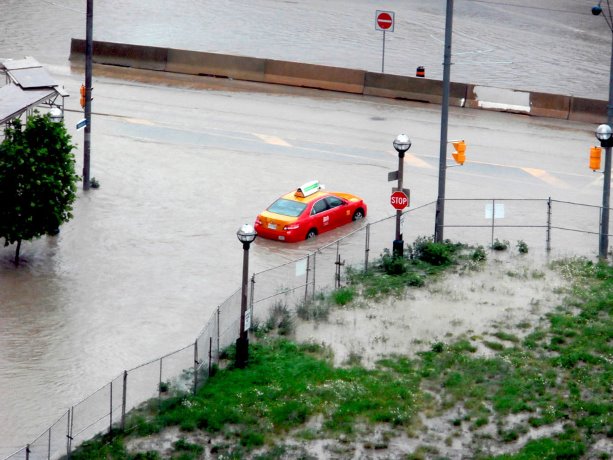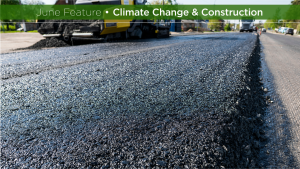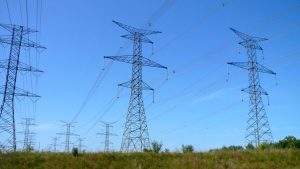The summer of 2017 could see the launch of an ominous new era as Ontario’s infrastructure proves incapable of dealing with the worst effects of climate change, an audience of Ontario Road Builders’ Association (ORBA) members was told at a seminar recently.
Blair Feltmate, head of the Intact Centre on Climate Adaptation (ICCA) in the Faculty of Environment at the University of Waterloo, delivered the message in a presentation titled Weather Gone Wild on day one of the two-day ORBA convention held in Toronto earlier this month.
Besides issuing the warning, Feltmate urged roadbuilders to adopt a long-term plan to identify the worst of a dozen possible climate change hazards that could hit Ontario and then act to take preventative measures.
Often, talk of climate change is theoretical, with politicians who control purse strings slow to take decisive steps, suggested Feltmate. That could well change this summer when the first large flood hits. Just in the past 12 to 18 months, he said, for the first time, some Ontario homeowners have been unable to obtain the flood insurance coverage required for rebuilds after a major flood.
"This summer, as soon as the next big flood hits, you are going to see people default on their mortgages en masse," said Feltmate in an interview after his presentation. "And that will hit the media. Once it’s in the media, then the politicians will take hold of it."
There was some good news for Ontario stakeholders in the construction sector as research compiled by the ICCA indicates that the province is at the head of the class in terms of provincial and territorial flood readiness — although its grade is only B-, compared with C- for Canada as a whole.
Various construction sectors were also surveyed for flood awareness by Feltmate’s ICCA and among roadbuilders, Ontario stakeholders trailed those of the Yukon, Manitoba and Alberta, who all received A grades. Ontario’s grade was B.
Typical survey questions for the roadbuilders asked them to respond to such prompts as: "our jurisdiction provides risk assessment tools and co-operates with owners/operators of highways and roads in flood risk assessment and in the development of adaptation initiatives"; and, "our jurisdiction mandates owners/operators of highways and roads to identify flood risks and approves adaptation initiatives."
Asked to identify next steps for roadbuilders, Feltmate said, "I would be going through a process to identify what are the key climate change extreme challenges that are going to be realized in different parts of Ontario going forward, at different times of the year
"Relative to those challenges, how do we prioritize them in terms of what can be addressed cost effectively and we have the technical capacity to execute on.
"You bring a guy like me in, I don’t know anything about roads, but there are a lot of people here who know a hell of a lot about roads," said the professor. "We can give them the profiles about extreme weather alerts, what you are going to have where. And then these guys go through it and say, that makes sense, that is stupid and you missed this. It doesn’t take very long at all."
Feltmate looked across North America to find examples of how climate events have hurt various economic sectors. A long-term chart illustrated that the value of catastrophic insurable losses across Canada has gone up inexorably since 1983, with occasional spikes from such events as the eastern ice storm of 1998, the Alberta and Toronto floods of 2013 and the Fort McMurray fire of 2016.
The Alberta flood, he said, caused a temporary halt in rail transportation that resulted in major losses to potash suppliers. The Canadian Pacific Railway lost $25 million in revenues due to extensive network flood outages.
As another example, the five-year drought in California has dramatically changed power economics there. Hydroelectric power has typically constituted 18 per cent of California’s electricity supply but today it’s down to 10 per cent as some hydro dams have become stranded assets.
So there is urgency for roadbuilders to act, said Feltmate, not only because disastrous climate events could and will strike at any time, but also because it is much cheaper to build adaptation measures while new projects are being undertaken than it is to tear apart existing infrastructure to incorporate technical fixes after the fact.
"At the time you are building stuff new, it costs the same to build it right as it does wrong," said Feltmate.
"It’s unbelievable. If you are building a new subdivision, it costs pennies more to put a 30-centimetre pipe in compared to a 20-centimetre pipe. You have done all the prep work, everything, but it has twice the discharge capacity."








Recent Comments
comments for this post are closed